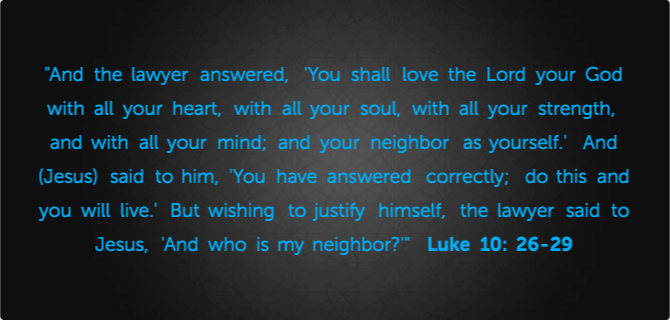
“And the lawyer answered, ‘You shall love the Lord your God with all your heart, with all your soul, with all your strength, and with all your mind; and your neighbor as yourself.’ And (Jesus) said to him, ‘You have answered correctly; do this and you will live.’ But wishing to justify himself, the lawyer said to Jesus, ‘And who is my neighbor?'” Luke 10: 26-29
Loving God means loving others. The two ideas are inseparable. In Luke chapter 10, a lawyer asked Jesus the way to earn eternal life. In typical Jesus fashion, He responded with a question: “What is written in the Law (the old testament)?” Referencing Deuteronomy 6:5 and Leviticus 19:18, the man replied: “Love God and love others” (My paraphrase).
Jesus knew this man had no hope of earning eternal life by obeying the law because God’s standard is perfection. Only one person ever lived a perfect life and that is Jesus. The lawyer continued: “Okay, but who exactly is my neighbor (My paraphrase)?” This was an important question because for the first century Jew, their “neighbor” referred to fellow Jews. Everyone else – Roman, Samaritan, and Arab – could be treated differently.
That’s when Jesus went one step further by applying this verse to everyone. It wasn’t about identifying the people we SHOULD love versus those whom we can ignore. It was about loving ALL people. Period. Jesus teaches us to START with loving our fellow believers within the church, in addition to always loving those outside the church, as well.
Now, let’s face it. There are some people – even in the Church – that are hard to love. But the kind of love Jesus is talking about here isn’t an emotion; it’s a decision of the will to love, whether you like that person or not. Ask God to help you love those around you – especially those difficult to love. Ask Him to help you love them in the same way that God loves the difficult ones like you and me.
Written by Bryant Wright, Founder, RFTH






